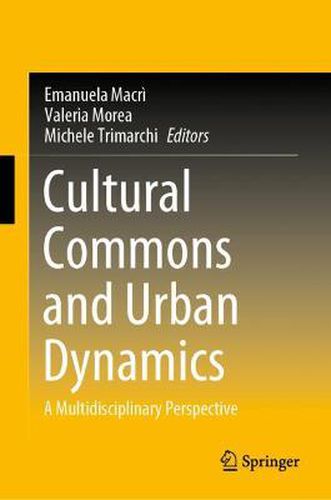Readings Newsletter
Become a Readings Member to make your shopping experience even easier.
Sign in or sign up for free!
You’re not far away from qualifying for FREE standard shipping within Australia
You’ve qualified for FREE standard shipping within Australia
The cart is loading…






This title is printed to order. This book may have been self-published. If so, we cannot guarantee the quality of the content. In the main most books will have gone through the editing process however some may not. We therefore suggest that you be aware of this before ordering this book. If in doubt check either the author or publisher’s details as we are unable to accept any returns unless they are faulty. Please contact us if you have any questions.
Today, cities are being intensively reshaped by unexpected dynamics. The rise and growth of the digital economy have fundamentally changed the relationship between the urban fabric and its resident community, overcoming the conventional hierarchy based on production priorities. Moreover, contemporary society discovers new labour conditions and ways of satisfying needs and desires by developing new synergies and links.
This book examines cultural and urban commons from a multidisciplinary perspective. Economists, architects, urban planners, sociologists, designers, political scientists, and artists explore the impact and implications of cultural commons on urban change. The contributions discuss both cases of successful urban participation and cases of strong social conflict, while also addressing a host of institutional contradictions and dilemmas. The first part of the book examines urban commons in response to institutional constraints from a theoretical point of view. The second and third parts apply the theories to case studies and discuss various practices of sustainable planning and re-appropriation in the urban context. In closing, the fourth part develops a new urban agenda as artists imagine it. This book will appeal to scholars interested in the social, economic and institutional implications of cultural and urban commons, and provide useful insights and tools to help local governments and policymakers manage social, cultural and economic change.
$9.00 standard shipping within Australia
FREE standard shipping within Australia for orders over $100.00
Express & International shipping calculated at checkout
This title is printed to order. This book may have been self-published. If so, we cannot guarantee the quality of the content. In the main most books will have gone through the editing process however some may not. We therefore suggest that you be aware of this before ordering this book. If in doubt check either the author or publisher’s details as we are unable to accept any returns unless they are faulty. Please contact us if you have any questions.
Today, cities are being intensively reshaped by unexpected dynamics. The rise and growth of the digital economy have fundamentally changed the relationship between the urban fabric and its resident community, overcoming the conventional hierarchy based on production priorities. Moreover, contemporary society discovers new labour conditions and ways of satisfying needs and desires by developing new synergies and links.
This book examines cultural and urban commons from a multidisciplinary perspective. Economists, architects, urban planners, sociologists, designers, political scientists, and artists explore the impact and implications of cultural commons on urban change. The contributions discuss both cases of successful urban participation and cases of strong social conflict, while also addressing a host of institutional contradictions and dilemmas. The first part of the book examines urban commons in response to institutional constraints from a theoretical point of view. The second and third parts apply the theories to case studies and discuss various practices of sustainable planning and re-appropriation in the urban context. In closing, the fourth part develops a new urban agenda as artists imagine it. This book will appeal to scholars interested in the social, economic and institutional implications of cultural and urban commons, and provide useful insights and tools to help local governments and policymakers manage social, cultural and economic change.